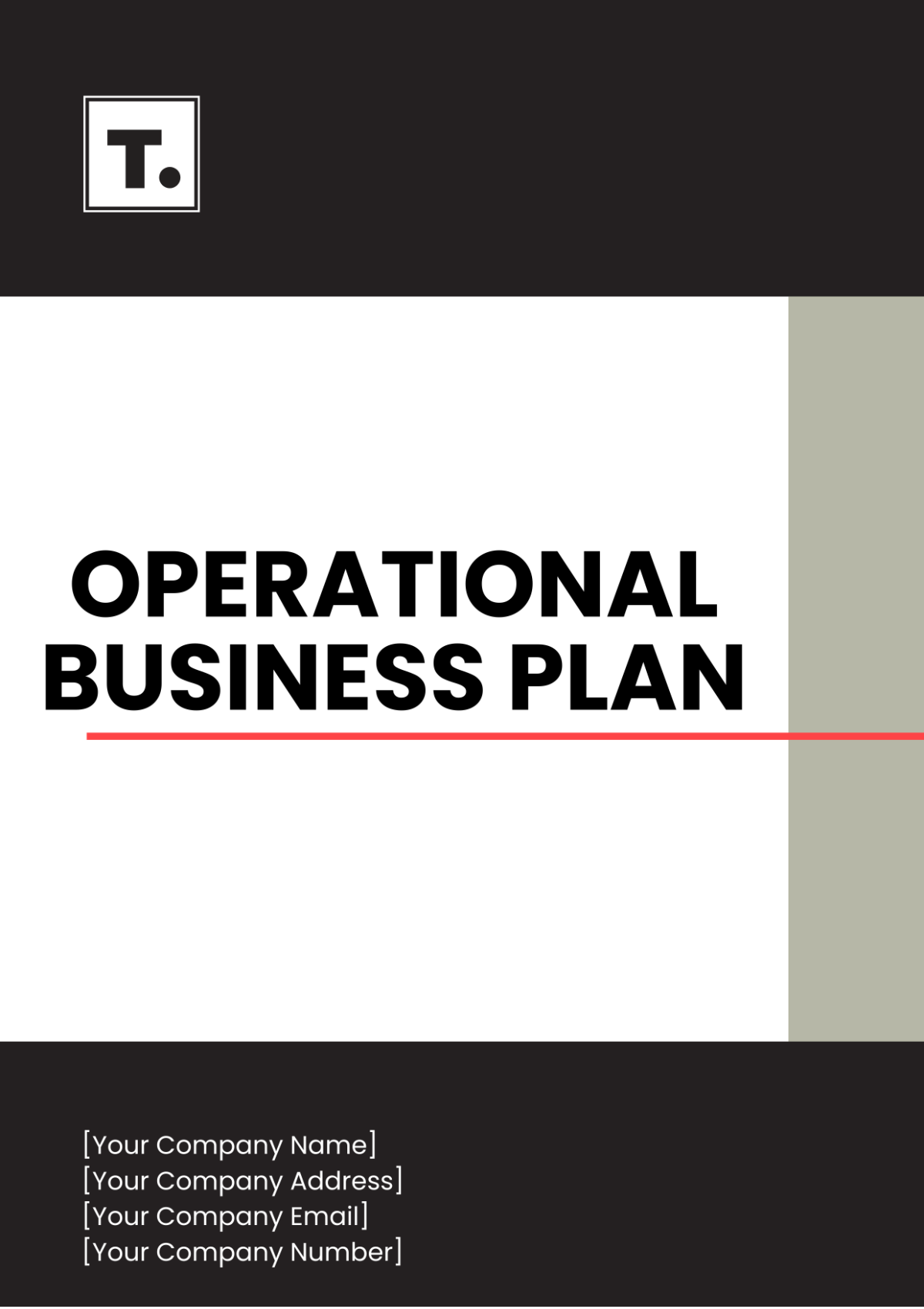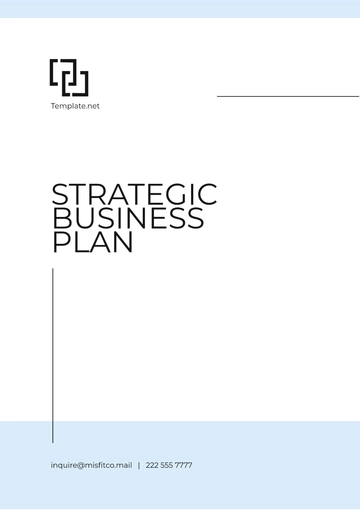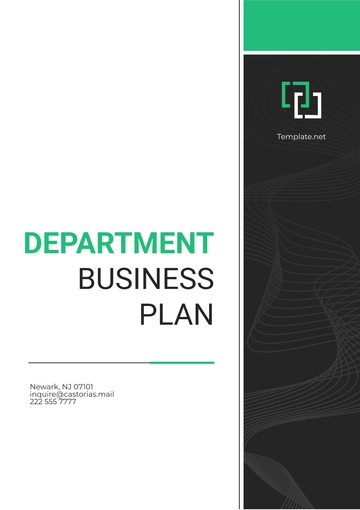Free Operational Business Plan

Prepared By: | [Your Name] |
Position: | [Your Position] |
Date: | [Date] |
I. Executive Summary
Our company, [Your Company Name], aims to streamline day-to-day operations to enhance efficiency, reduce costs, and improve overall performance. By focusing on operational excellence, we will strengthen our competitive position in the market and achieve sustainable growth. This plan outlines our strategic approach to achieving these objectives.
II. Company Overview
[Your Company Name] is a leading provider of innovative software solutions for businesses across various industries. Founded in 2050, our mission is to empower organizations with cutting-edge technology to optimize their operations and drive success. With a dedicated team of experts and a commitment to customer satisfaction, we have established ourselves as a trusted partner in the digital transformation journey.
III. Operational Goals
Increase operational efficiency by 20% through process automation and optimization by 2055.
Enhance product quality and reliability to achieve a customer satisfaction rating of 95% by 2060.
Improve resource utilization and reduce waste to achieve a cost savings of $1 million annually by 2053.
IV. Operational Strategies
Implement advanced analytics tools to identify inefficiencies and bottlenecks in our processes.
Invest in employee training and development programs to enhance skills and productivity.
Strengthen collaboration between departments to streamline communication and decision-making.
V. Action Plans
Action Item | Description | Responsible Party | Deadline |
|---|---|---|---|
Develop a process improvement roadmap | Prioritize initiatives and set timelines for implementation | Operations Manager | Q2 2051 |
Launch company-wide training initiative | Identify key skill areas and develop training programs | HR Department | Q4 2052 |
Implement advanced analytics tools | Procure and integrate analytics software | IT Department | Q1 2053 |
Establish cross-functional teams | Form teams to address specific operational challenges | Department Heads | Q2 2053 |
Monitor progress and adjust strategies | Review KPIs and make necessary adjustments | Management Team | Ongoing |
VI. Budget
Category | Allocation | Details |
|---|---|---|
Personnel | $500,000 | Training and development programs for employees. |
Technology | $1,500,000 | Procurement and integration of advanced analytics tools. |
Miscellaneous | $300,000 | Additional resources for operational improvement initiatives. |
VII. Risk Management
Before delving into the specifics of the risk management plan, it's crucial to identify potential threats and challenges that could impede the successful execution of our operational strategies. Below is an analysis of key risks and corresponding mitigation strategies:
Risk | Description | Mitigation Strategy |
|---|---|---|
Potential delays in technology implementation | Complex implementation processes or unforeseen technical issues may cause delays in project timelines. | Regular communication with the IT team, proactive troubleshooting, and contingency plans for potential setbacks. |
Resistance to change among employees | Employees may resist new processes or technologies, hindering adoption and effectiveness. | Comprehensive change management plan, including communication, training, and incentives to encourage buy-in and participation. |
External factors (e.g., economic downturns, market fluctuations) | Economic fluctuations or changes in market conditions may impact resource availability and project viability. | Diversification of revenue streams, financial contingency planning, and regular monitoring of market trends |
VIII. Monitoring and Evaluation
Monitoring and evaluation are integral components of our operational plan, ensuring that we stay on track toward achieving our goals and objectives.
Monthly Review Meetings: Regular meetings will be held to assess progress against key performance indicators (KPIs) and milestones. These meetings provide an opportunity to identify any deviations from the plan and make necessary adjustments promptly.
Quarterly Performance Assessments: Every quarter, a comprehensive assessment will be conducted to evaluate the overall effectiveness of the operational plan. This assessment includes analyzing performance data, identifying areas for improvement, and determining if adjustments are needed to align with evolving business needs.
Annual Reviews: At the end of each year, a thorough review of the operational plan will be conducted to assess its impact on business outcomes and identify lessons learned. This review helps in refining strategies for the upcoming year and ensures continuous improvement in our operational processes.
IX. Conclusion
This business plan outlines key strategies to boost efficiency, cut costs, and enhance operations, setting the stage for improved productivity and sustainable growth. It emphasizes continuous improvement and risk management to maintain agility in a changing market. With a committed team focused on our objectives, we are well-equipped to navigate challenges and seize opportunities, ensuring long-term success.
- 100% Customizable, free editor
- Access 1 Million+ Templates, photo’s & graphics
- Download or share as a template
- Click and replace photos, graphics, text, backgrounds
- Resize, crop, AI write & more
- Access advanced editor
Unlock your business's full potential with the Operational Business Plan Template from Template.net. This comprehensive tool is both editable and customizable, allowing you to tailor it precisely to your organization's needs. Streamline your planning process, optimize operations, and achieve your business goals efficiently. Elevate your strategic approach and drive success with this versatile template.
You may also like
- One Page Business Plan
- Coffee Shop Business Plan
- Restaurant Business Plan
- Food Business Plan
- Real Estate Business Plan
- Executive Summary Business Plan
- Cover Page Business Plan
- Nonprofit Business Plan
- Daycare Business Plan
- Construction Business Plan
- Startup Business Plan
- Medical Business Plan
- Bakery Business Plan
- Service Plan
- Hotel Business Plan
- Catering Business Plan
- School Business Plan
- Healthcare Business Plan
- Transportation Plan
- Sports Plan
- Car Wash Business Plan
- Salon Business Plan
- Clothing Business Plan
- Farming Business Plan
- Boutique Plan





























